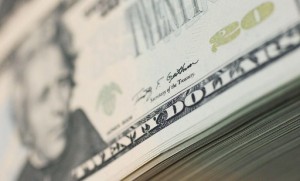TOKYO— The dollar was mixed in Asian trading on Monday as it faced pressure from data that showed US consumer spending was down in April although shoppers’ confidence climbed.
The greenback gained on the yen as Tokyo’s Nikkei 225 stock index pared back some of its early losses. The index is closely linked with the yen as the currency’s value affects the profitability of Japanese exporters.
Credit Agricole said dollar strength was likely to continue.
“We expect USD/JPY downside to be increasingly limited and stick to the view that the pair will ultimately resume its uptrend,” it said.
In Tokyo morning trade, the dollar bought 100.67 yen, gaining from 100.37 yen in New York late Friday, while the euro was also stronger against the Japanese currency at 130.89 yen from 130.44 yen last week.
Against the dollar, the European single currency was slightly stronger at $1.3004, from $1.2996 in US trading.
On Friday, the US Commerce Department reported that consumer spending dropped by 0.2 percent in April, the first monthly fall since May 2012 and a signal that growth slowed at the beginning of the second quarter.
Offsetting that was a jump in the Chicago area manufacturing PMI index to 58.7, its highest since March 2012, and the University of Michigan consumer confidence barometer, which rose to a better-than-expected 83.7, the highest since July 2007.
A US jobs report this week will be a key factor in whether the Federal Reserve begins to taper its open-ended $85 billion a month asset-purchase program aimed at supporting economic growth.
The euro faced pressure from data that showed the 17-nation bloc’s unemployment rate hit a new record high, at 12.2 percent April, while retail sales fell in Germany, the region’s leading economy.
However European central bank chief Mario Draghi said Monday the organization expects a “very gradual recovery” in the debt-crisis-hit eurozone to start later this year.
“The economic situation in the euro area remains challenging but there are a few signs of a possible stabilisation,” he told a financial conference in Shanghai.
The ECB cut interest rates last month in an attempt to stimulate the eurozone’s recession-ridden economy, shaving a quarter of a percentage point off the “refi” rate on its main refinancing operations to 0.50 percent.
The central bank holds a policy meeting later this week which will be closely watched for signs the ECB plans to launch more economy-boosting measures.
Currency markets will also be digesting news Monday that China’s manufacturing activity shrank more than first reported in May, according to HSBC, confirming the first contraction in seven months.
